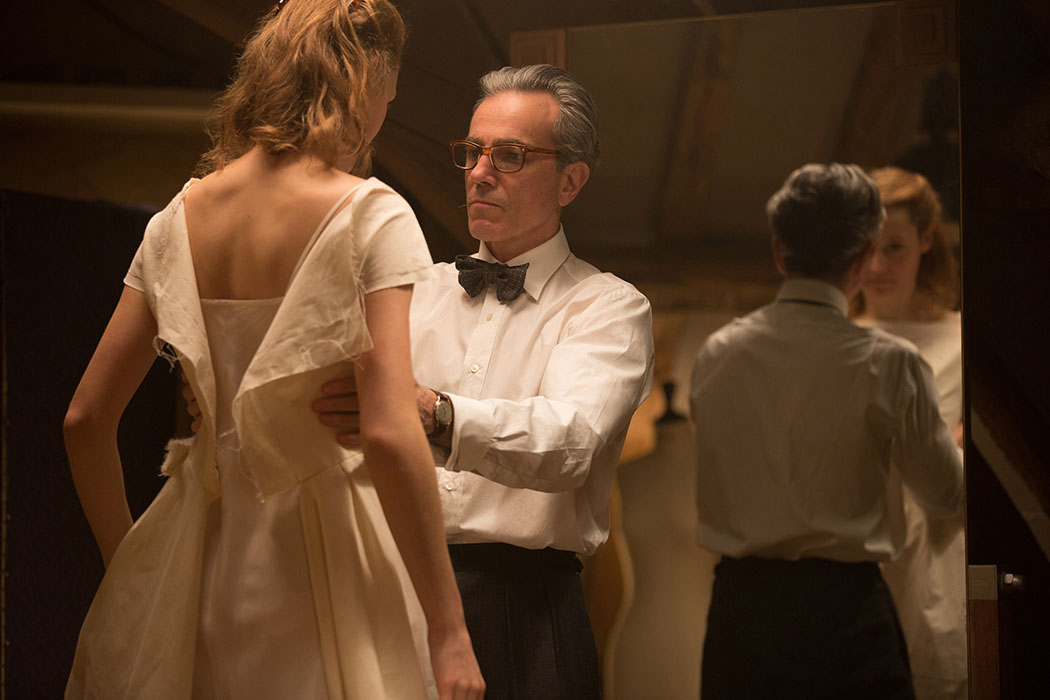For the past year, a question of great significance to movie-lovers everywhere hung in the air over the film world. We awaited anxiously the return of one of cinema’s most potent and acclaimed sets of collaborators—director Paul Thomas Anderson and leading man Daniel Day-Lewis—and we have wondered whether they could, once again, work the same magic that inspired their last endeavor. A decade ago, the duo gave audiences an instant classic in There Will Be Blood, a story that succeeded simultaneously as the most intimate of character studies as well as the most ambitious and self-assured of allegorical epics. Now, in their latest effort, the sprawling badlands of Southern California oil country give way to the manicured interiors of London high society, with quieter yet no less enthralling results.
Like There Will Be Blood, Phantom Thread deals with great men—or, at least, men who believe themselves to be great. Day-Lewis, as Reynolds Woodcock, plays a couture fashion designer who occupies one of the highest seats in the 1950s fashion world, designing gowns for cultured elites and foreign royalty. He is obsessive, exacting, and scrupulous to a fault. His days are regimented to such a degree that the slightest diversion—say, the excessively noisy pouring of tea at breakfast—can derail his work for the rest of the day. Anderson has stated that Reynolds is modeled, in part, on such enigmatic characters of the fashion world as Cristóbal Balenciaga and Christian Dior, and he exhibits the bravado to match those comparisons. He is truly great at what he does, and he certainly knows it.
Enter Alma Elson (Vicky Krieps), an immigrant waitress working at the countryside inn to which Reynolds escapes while his devoted sister, Cyril (Lesley Manville), cleans up the mess of his latest failed love affair back in London. Alma and Reynolds swoon for one another immediately, and in no time at all he whisks her away to his London estate. Their very first night together sets the tone for the couple’s turbulent relationship; the intimate mood morphs suddenly into something darker when Reynolds asks Alma if he can measure her for a dress. Cyril appears, as if on cue, and begins jotting down the increments rattled off by the tape measure-wielding Reynolds. Alma, meanwhile, is bared before the siblings like a specimen in a laboratory. A decidedly unromantic beginning to the couple’s affair, rescued only by Reynolds’s urbanity and Alma’s grace. However, unlike the aristocratic darlings that Reynolds typically dresses, Alma is not so enamored with the man’s reputation as to remain cowed in the face of his discourtesy. She rebukes him, and his surprise is palpable. He seems to realize, perhaps unconsciously, that he has finally met his match, so to speak—someone who won’t bow to his every whim, a partner rather than another mannequin.
As much as Phantom Thread is a tale of romance between Reynolds and Alma, it also plays as a love letter to cinema itself. The close reader can’t help but notice certain parallels between Reynolds Woodcock and Alfred Hitchcock that extend beyond name alone. Both are undeniably fanatical, demanding artists. Both, also, exhibit a similarly ambiguous sexuality and fall for strong women named Alma. Anderson’s intimate domestic spaces and tender close-ups also recall the mid-century melodramas of Douglas Sirk, while the twisted dynamic at the heart of the film’s central relationship evokes the work of Sirk’s tortured heir, Rainer Werner Fassbinder. Phantom Thread painstakingly synthesizes Anderson’s lifelong love affair with cinema into a cohesive work that is at once reverent and profane towards its inspirations.
If, as he has claimed publicly, this is in fact Day-Lewis’s last appearance on film, a tragedy will have befallen us all. But I can think of no better note to go out on, nor any better consolation than the discovery of Vicky Krieps, whose performance dumbfounds through its strength, nuance, and humor. Phantom Thread is the work of craftsmen at the height of their prowess; here I speak not only of Anderson, Day-Lewis, and Krieps, but also of Jonny Greenwood whose truly ineffable score brings something to the film that guides us through a complex world and asks us to care for a character we might otherwise not. This ensemble of talents, among many others unnamed here, offers us in Phantom Thread what every art lover always seeks: a masterpiece. I’m starving for the next one.








